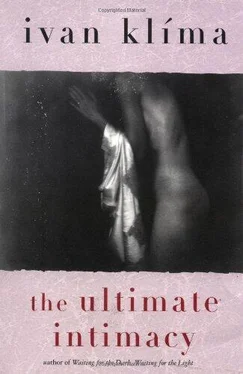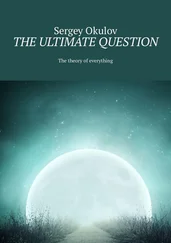Ivan Klima - The Ultimate Intimacy
Здесь есть возможность читать онлайн «Ivan Klima - The Ultimate Intimacy» весь текст электронной книги совершенно бесплатно (целиком полную версию без сокращений). В некоторых случаях можно слушать аудио, скачать через торрент в формате fb2 и присутствует краткое содержание. Год выпуска: 1998, Издательство: Grove Press, Жанр: Современная проза, на английском языке. Описание произведения, (предисловие) а так же отзывы посетителей доступны на портале библиотеки ЛибКат.
- Название:The Ultimate Intimacy
- Автор:
- Издательство:Grove Press
- Жанр:
- Год:1998
- ISBN:нет данных
- Рейтинг книги:3 / 5. Голосов: 1
-
Избранное:Добавить в избранное
- Отзывы:
-
Ваша оценка:
- 60
- 1
- 2
- 3
- 4
- 5
The Ultimate Intimacy: краткое содержание, описание и аннотация
Предлагаем к чтению аннотацию, описание, краткое содержание или предисловие (зависит от того, что написал сам автор книги «The Ultimate Intimacy»). Если вы не нашли необходимую информацию о книге — напишите в комментариях, мы постараемся отыскать её.
The Ultimate Intimacy — читать онлайн бесплатно полную книгу (весь текст) целиком
Ниже представлен текст книги, разбитый по страницам. Система сохранения места последней прочитанной страницы, позволяет с удобством читать онлайн бесплатно книгу «The Ultimate Intimacy», без необходимости каждый раз заново искать на чём Вы остановились. Поставьте закладку, и сможете в любой момент перейти на страницу, на которой закончили чтение.
Интервал:
Закладка:
The hotel is luxurious. A doorman in purple livery and a red top-hat stands in front of the glass-panelled doors. The front hall is all marble. They smile at Bára from the reception; all they want is her signature and then they issue her with a key. Saša rebuffs the porter who is making for their luggage and he takes his mother up in the lift to the sixth floor.
'Here we are, dear Bára,' he says to her when he has opened the door, 'I know I'm not the one you'd prefer to be here with.'
'Now, now, darling,' Bára says, stopping his mouth, 'I may have taken you away from your father, but I've never rejected you.'
'That's true,' her son admits. 'Shall we unpack?'
'No,' Bára decides. 'We've come to see Gaudi, haven't we, not to
hang up our clothes.' And she remembers how at home about a month earlier she first cautiously mentioned the possibility of their all going together to see Gaudi's buildings. Samuel snapped back that he hadn't the slightest desire to travel anywhere; as far as he was concerned, Gaudi's work was more a farewell to the old era than the starting-point of the new one. Then he made a scene about Bára wanting to run away from the jobs she had in hand and enticing her son to idleness, as if he wasn't indolent enough already and good for nothing. She pointed out that she also had the right to a few days' leave and it would do Saša good to get away before his allergy came on.
Samuel generously conceded that he couldn't stop her from going but he wasn't going to pay her son's fare (he always referred to Saša as 'your son').
She felt like saying that he wasn't going to pay her fare either, but simply commented that she earned enough money to afford to treat her son to a seaside holiday, particularly since it was what the doctors had recommended for him. Samuel did not agree, of course, and it sickened her to argue about money. But Samuel was outraged at the very fact that it had crossed her mind and launched into a monologue about a spoilt mother spoiling her son too. He concluded by offering her a divorce or his own death. He wouldn't be in her way any more and she wouldn't have to put up with sickening rows over money.
Bára said no more, but when she went to bed that evening she wept over the hopelessness of their marriage and her entire future.
She can feel the tears coming to her eyes once again, but they are not tears of despair. Instead, she feels like weeping because for the first time in many months, or years even, she feels free from the husband who has become her torment. For the first time in her life she is alone like this for a whole week with her son to whom she so often feared showing affection in front of his stepfather.
They leave the hotel. There is a clear blue sky and a tepid wind is blowing in from the sea. Gone is the suffocating blanket of cloud that hangs over Prague in February. Even Saša is able to breathe without difficulty. A short way from the hotel, as she discovers from the town plan, stands Gaudi's Casa Mila, nicknamed the stone quarry on account of its colour, asymmetry and massiveness.
Bára knows the building from photographs, of course, and knows almost everything that has been written about it, but now, standing in
front of it, she is overwhelmed by the unfettered genius while feeling somehow overcome by her own ordinariness and insignificance.
They are fortunate to find that a group of tourists, or rather interested professionals, is just making its way into the building and they manage to tag along behind and see the round courtyard and climb the staircase between the countless pillars. Everything here is unusual, from the lattice work to the windows, not to mention the enormous lamps, and when they climb right up to the roof, they find themselves in a bizarre realm of chimneys, each one of which could be a sculpture by Henry Moore or Miró. Between the chimneys she can see the sky and the towering mountains in the distance. As always when she finds herself somewhere high up, Bára gets an attack of dizziness, but on this occasion it is caused not by the height but by the beauty of the scene. She finds it stunning. She puts her arm around her sons shoulders and kisses him, before thrusting the camera into his hands and requesting him to take a photo of her beneath a chimney resembling a giant in armour.
When they leave the roof Saša praises it as 'really something' and Bára bursts into tears for the second time today. She weeps because she is happy and also because it never occurred to her husband, whom she has loyally served for fifteen years, that he might grant any of her wishes or do something to please her, which would earn him no more than her love and gratitude. It had taken that pastor for whom she was able to do nothing but show love and gratitude. But what is showing him love when she scarcely has any time left for him? What sort of nonsense is it that she spends her time with someone who torments her and doesn't have time for someone who is kind and considerate to her?
They leave Gaudi s building on their own, but Bara's impatient thirst is not yet slaked. She is anxious that what she doesn't manage to see today she never will. After all, she might not live to see tomorrow or some bad news might arrive from home and she'll be obliged to return immediately.
So they take a taxi, and since Saša prefers the countryside to the city, they drive to the Parque Giiell. They walk past the fairy-tale porters lodge and then go up the steps guarded by the terrifying Python, before hurrying through the avenue of palm trees and sitting down on a stone seat covered in crazy ornaments.
Bára asks her son whether he isn't bored and promises him she'll
take him to a disco tomorrow and also to a football or tennis match, or a bullfight, if anything of the kind is held at this time of year. Or they can go on an excursion somewhere, maybe to the mountains, that seem so close from here. Saša tells her he is totally happy here and then he remembers his stepfather who is sitting home swallowing tablets instead of sitting here and having a good time. But it's just as well, because if he were here, they wouldn't be having a good time.
We have to call him anyway, Bára realizes, and feels a cold blast of air from her distant home; in a few days' time she will return to her trap and Samuel will never forget that she opposed him and left without him, and actually took her son with her, even though he had expressly forbidden it. She knows that she has rebelled and will have to pay for it, though it is not yet clear to her in what manner.
They drive down to the sea and watch the cargo ships in the distance and the enormous cranes. Green buoys rock back and forth beyond the harbour. Bára makes out two seagulls sitting on one of them. Their positions are so perfectly symmetrical and they are so still that Bára is no longer sure whether they are real or carved. She gazes at them steadily while Saša inhales the sea air which is free of the swirling pollen that suffocates him at home. At least a quarter of an hour passes and the gulls are still motionless. Perfect symmetry, Bára realizes, and in her mind she confides it to Daniel. Like the perfect order that Samuel dreams of, it means the end of life and it's even the death of art since it precludes shifts or movement and rules out surprise. And yet art has always sought symmetry: in drawing, in verse, in music, in building, in ornament. It seeks paradise but falls prey to the urge for death. Wasn't that like religion? It seeks to confine life and love within an order, by means of regulations and proscriptions. It makes it a sin to break them and therefore banishes any freedom and movement from life. Happily, from time to time, some wayward soul is born, some Gaudi, who questions the prevailing order and symmetry, in order to rescue life.
Finally, in obedience to the same law of life, the gulls move and both fly off together and soar above the waves.
Читать дальшеИнтервал:
Закладка:
Похожие книги на «The Ultimate Intimacy»
Представляем Вашему вниманию похожие книги на «The Ultimate Intimacy» списком для выбора. Мы отобрали схожую по названию и смыслу литературу в надежде предоставить читателям больше вариантов отыскать новые, интересные, ещё непрочитанные произведения.
Обсуждение, отзывы о книге «The Ultimate Intimacy» и просто собственные мнения читателей. Оставьте ваши комментарии, напишите, что Вы думаете о произведении, его смысле или главных героях. Укажите что конкретно понравилось, а что нет, и почему Вы так считаете.






![Theresa Cheung - The Dream Dictionary from A to Z [Revised edition] - The Ultimate A–Z to Interpret the Secrets of Your Dreams](/books/692092/theresa-cheung-the-dream-dictionary-from-a-to-z-r-thumb.webp)





